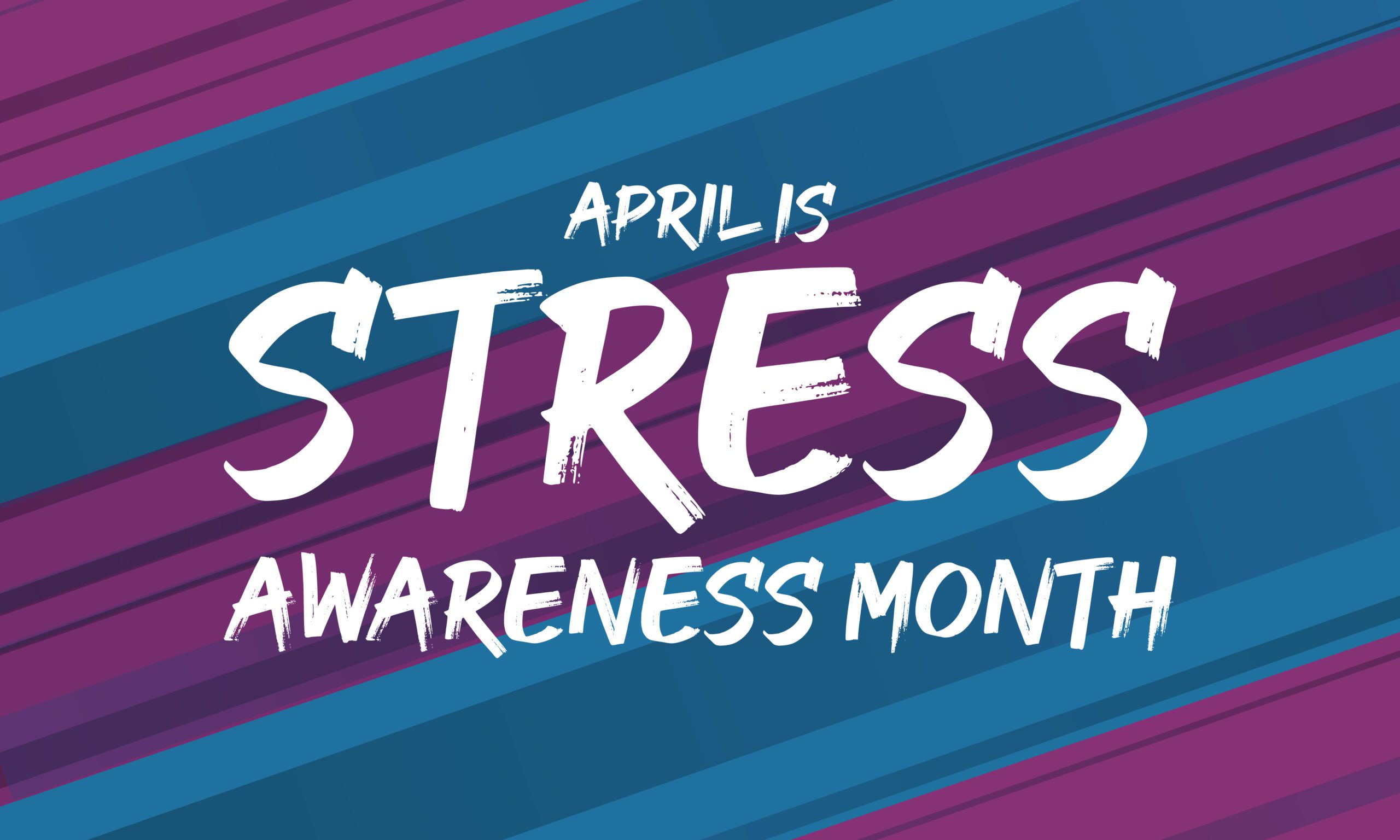*This is an article from the Winter 2021-2022 issue of Contentment Magazine.
By Jeff Jernigan, PhD, BCCPC, FAIS
My grandmother was born in 1885 and lived through some phenomenal times until her passing in 1978. When I was a boy, she would tell stories of her childhood sitting around listening to her parents and uncles talk about the Civil War and the Indian Wars. She remembered traveling to Europe by steamer because there were no airplanes in those days. She remembered Kitty Hawk, Henry Ford, and finally getting the right to vote. Airplanes, automobiles, and the Suffrage Movement were living history for her. When I asked her about how she felt about all these changes she simply answered after a moment of reflection, “Today is the same as yesterday and tomorrow will be no different.”
What are the inherent qualities of change? Why do things change, and what is the push or cause for change in our lives? All of us experience the effects of change every day. Just think about what has changed in your lifetime. Freeways began appearing across the country in the 1920’s and created a countrywide network by the early 1950’s. Commercial jet aircraft service began in 1952. Epidemic polio, pneumonia, measles, and tuberculosis were virtually eliminated in the United States by the early 1960’s. Air conditioners, washing machines and dryers, dishwashers, and televisions were not standard home appliances until the early 1970’s. Laptops, cell phones, and smart watches used to be science fiction and now we are using these every day. All these large changes trickle down into our lives and change our travel, our health, and how we get work done along with many other things about our daily lives.
We don’t recognize how much things constantly change because of this trickle-down effect. Now, living in the 21st century, it is a little easier to comprehend because technology is moving ahead so fast, but it is still difficult in the moment to grasp the reality of change and its impact on us personally, because, like she said, it seems today is the same as yesterday and tomorrow will be no different.
This is very troubling when prolonged stress and uncertainty is a significant part of our daily experience. My grandparents talked about WWI and WWII this way, and my parents lived in an era when nuclear war was a constant threat. I remember neighbors building bomb shelters and teachers having us practice scrambling under desks at school when the alarm sounded. And now we and our children are living through a pandemic.
None of us in the history of the world have escaped the reality of constant change in our lives. This is great when times are good! When times are not so good it is wearing, depleting, and even depressing. Our resistance wears thin, and our resilience seems to have taken a holiday just when we need it to be present. To understand how to thrive in the chaos of unwanted change we must first understand how we respond to crisis, and how to use this knowledge to manage change in our lives constructively.
Growing weary of difficult times is natural, as is the way it can creep in and surprise us. For example, prior to the pandemic exploding across the globe in early 2020, the airline industry reported more than 100 people banned for life in the previous five years for acting out in a manner to endanger passengers and interfering with aircraft operation. In the eighteen months or so since the pandemic got into full swing this number has climbed to more than 5,000 banned for life. 100 in five years has become more than 5,000 in one-and-a-half years. Why? Because of pent up resentment, anger, and fear in the face of limited or no capacity to manage one’s self any longer. Along comes a trigger that may have nothing to do with present circumstances and over the top we go! This can happen when we have no margin left whatsoever.
Personal crisis follows a natural pattern. Life events creep up on us (slowly or suddenly) and the cumulative stress involved pushes us into a crisis mode. The amygdala (the threat-processing center in the brain) kicks in and the adrenaline starts flowing. Heart rate picks up, breathing becomes rapid, and we go on high alert as our fight or flight response kicks in.
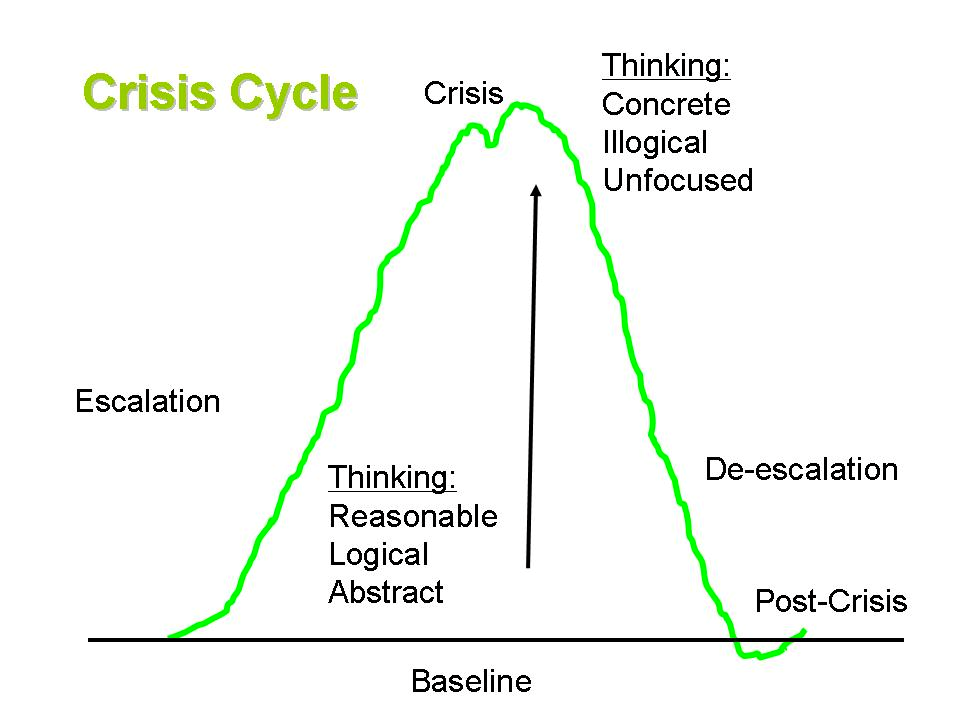
In the blink of an eye, our thinking goes from reasonable to illogical and we act out. Some sort of de-escalation is needed, and if we cannot provide this for ourselves, someone else is going to have to provide this for us. Once we are calmed down, we may begin to wonder what got into us, and feel embarrassed or even ashamed. There is always a let-down after a crisis, whether or not we have these feelings.
Usually, we have sufficient resilience and margin to not come to a point where we lose control and act out. Normally we have enough reserves of energy, patience, and self-control. When we no longer have these reserves our stress load will exceed our margin, and this is when acting out can occur. The key, of course, is shedding stress with regularity and sustaining resilience.
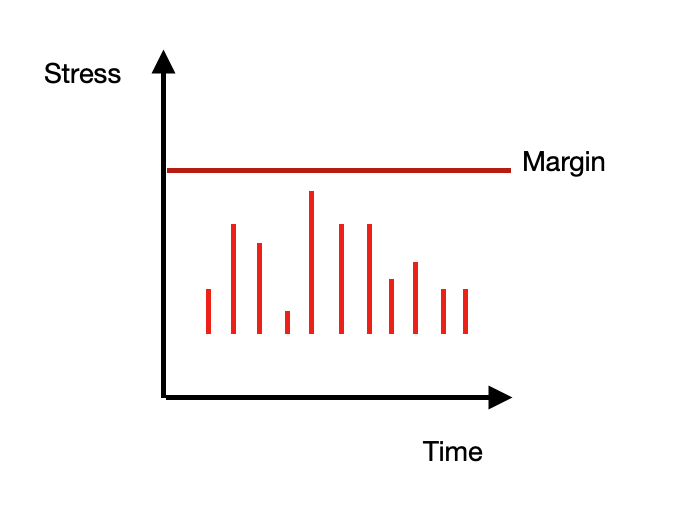
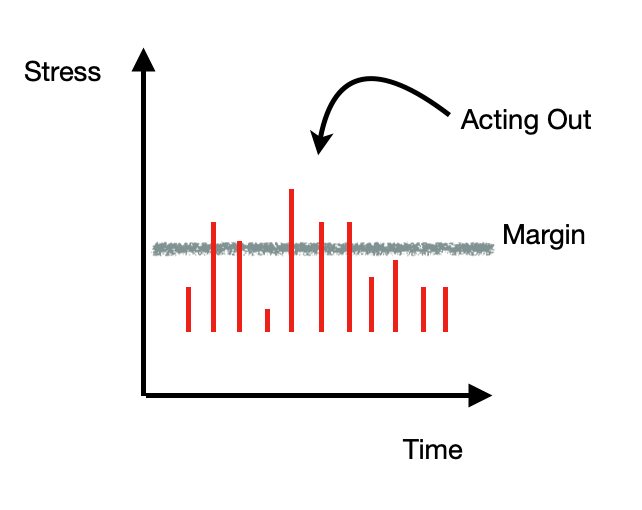
Our psychology can sometimes trip up our biology, and vice-versa. Worry and fear produce anxiety, while discouragement and feeling trapped by circumstances can produce depression. At the same time, lack of sleep, poor diet, and physical fatigue can produce the same things. Our external environment has a lot to do with our physiology and psychology as well.
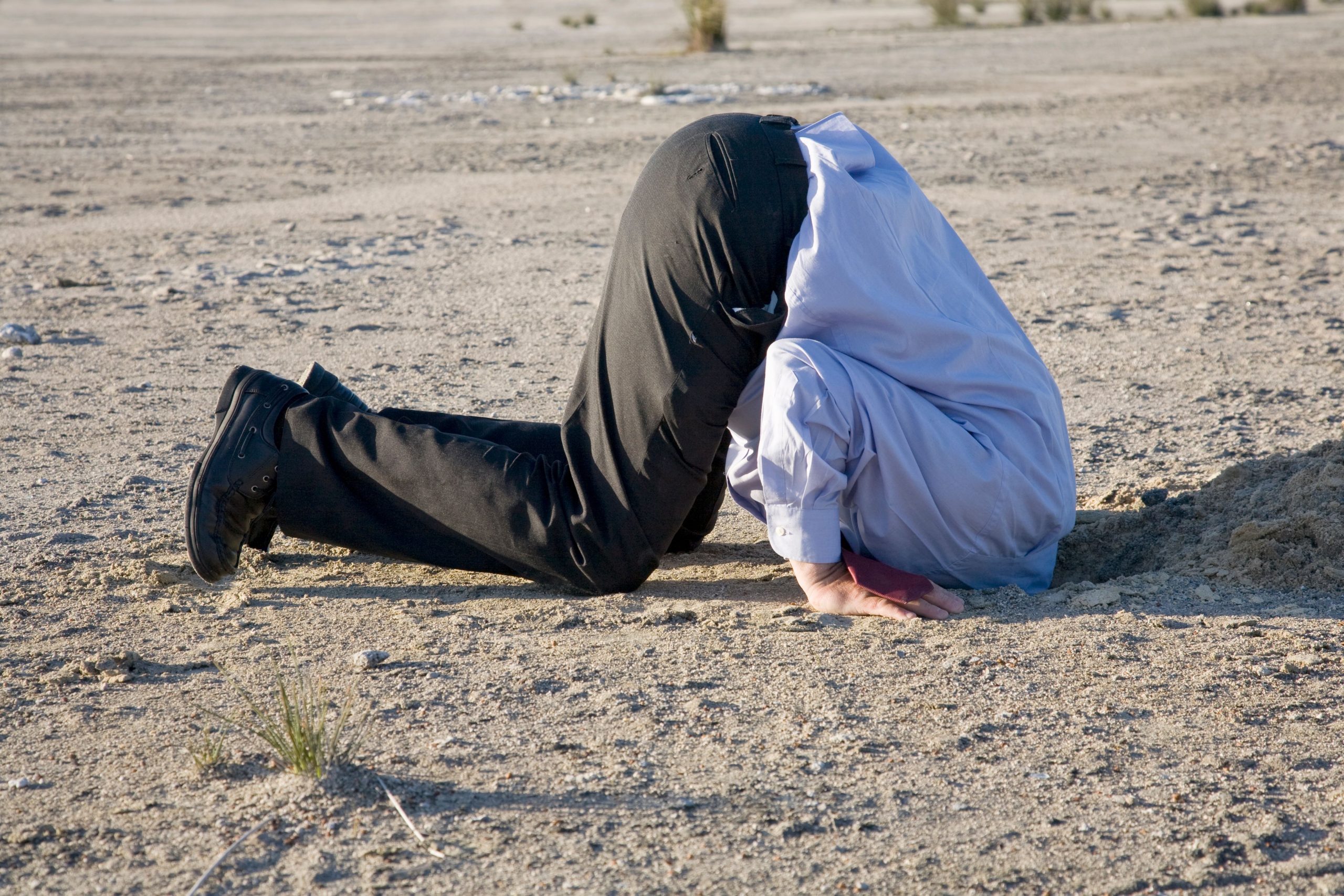
Change always meets with some initial resistance as a normal and healthy reaction. Our amygdala, acting as a sentry for everything our five senses perceive and our internal sensors report (temperature, heart rate, pain and physical discomfort, fatigue), kicks in with a result we experience as skepticism, doubt, or resistance when we first understand we are faced with a change. Not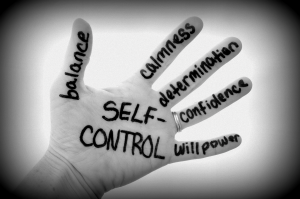 all change is a good thing, so this reaction gives us a pause to evaluate how we are going to respond. Sometimes it is obvious the heralded change is a good thing (I am getting a promotion) and easy to adapt to, while other changes may not be so positive (the pandemic has put us back into lockdown).
all change is a good thing, so this reaction gives us a pause to evaluate how we are going to respond. Sometimes it is obvious the heralded change is a good thing (I am getting a promotion) and easy to adapt to, while other changes may not be so positive (the pandemic has put us back into lockdown).
We always have three choices: fully embrace the change, modify the change, or refuse to change. Knowing we have a choice actually takes away some of the stress of being confronted with an involuntary opportunity to wear a mask, for example. Or choose to wear other personal protective gear that serves the same purpose or refuse to wear a mask at all. Hopefully, we all make choices which have little negative consequences for ourselves or others. Identifying the choices we have is healthy because we minimize the internal struggle we may experience when it feels like we are losing control of our lives. We won’t always have the freedom to choose to do whatever we want to do, but we will always have the freedom to choose to do the right thing. When we have choice, we have control. In fact, there are a lot of things we can control.
There are a number of things we can do to manage change in our lives, especially in the midst of chaotic change. Here are some things you may not have thought of in the context of maintaining margin and choice in these challenging times.
De-escalation is a skill you can use any time you recognize rising angry, hostile, or rebellious attitudes surfacing in your thinking. This usually emerges in response to a sense of worry or defensiveness:
- Find a place to sit as comfortably if possible. Take three deep breaths, slowly inhaling and slowing exhaling. Don’t hold your breath. This will turn off the amygdala and lesson agitation. Repeat as necessary.
- When someone says or does something you perceive as weird or irrational, try not to judge or discount their feelings. Whether or not you think those feelings are justified, they’re real to the other person.
- Respect the other person’s personal space if not already social distancing. If possible, stand at least two to three feet away from a person who’s escalating (or if it is you who is escalating). Allowing personal space tends to decrease a person’s anxiety and can help prevent acting-out behavior.
- The more a person loses control, the less they hear your words and the more they react to your nonverbal communication. Keeping your tone and body language neutral will go a long way toward defusing a situation.
The Crisis Prevention Institute offers more tips in their free CPI’s Top Ten Tips booklet.1
Humor is a great way to back off from taking yourself so seriously. I have a coffee mug on my desk with a simple statement baked in that makes me laugh and reminds me to tone down.
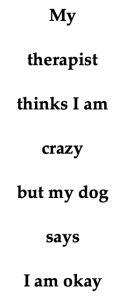
Yes, my dog talks, but that is a different issue entirely. Often the obvious and simplest solution is counterintuitive. Rest will enable you to regain perspective as will story-telling with trusted friends. Are you getting eight hours of sleep every night? Do you have friends that can actively listen to your latest story (experience) and also count on you to actively listen to theirs? This kind of processing sheds stress rapidly through experiencing being listened to, understood, and taken seriously.
Psychological First Aid (PFA) is an evidence-informed approach that is built on the concept of human resilience. PFA aims to reduce stress symptoms and assist in a healthy recovery following a traumatic event, natural disaster, public health emergency, or even a personal crisis. There is even a version of PFA for self-care:
- Do you recognize signs of stress in yourself? Take some time to de-escalate. Be mindful and listen to yourself. Have you noticed any changes? Is it time to take a break?
- Have you connected lately with trusted friends and family? Are you using a journal to connect with yourself? Often standing up and reading what you wrote in your journal out loud provides insight and relief. This is not recommended for a group activity!
- Engage in refreshing activities which can balance the more stressing things you are involved in. Focus on positivity.
Positivity leads to optimism and hope and changes your mindset or perspective. Neurologically, it produces dopamine, serotonin, and other feel-good chemistry in your brain. You are not tricking yourself into feeling better about your situation. You are taking advantage of how our brains work by making the decision cognitively to be positive and experiencing how volitional choice regarding an emotion (positivity) will be followed by a change in your feelings.
This works for dreaming as well. When we fall asleep what we intentionally are thinking about is handed off to our subconscious which goes to work continuing our thought process. Imagine a shift change at the end of the day handing off a project to the night shift. If you are intentionally focused on positive things, that will continue as you fall asleep producing the same sense of optimism and hope it does when you are awake. One of the things I like to do is think about all the things I am grateful for in the day or week which just passed. Gratitude can be healing.
Change is a part of our lives. Sometimes barely noticed, sometimes roaring through our lives like a berserk freight train. Sometimes pleasant and encouraging, sometimes difficult and discouraging, but always present. It is a reality in life we cannot escape. Better to embrace change as a reality and lean into it with a positive attitude knowing we still have choices and can manage change in our life no matter how easy or challenging it may be. Sustain your resistance, increase your margin, manage your stress, and be forever grateful.
“Piglet noticed that even though he had a very small heart, it could hold a rather large amount of gratitude.” A. Milne, Winnie the Pooh
Reference
ABOUT THE AUTHOR

Jeff Jernigan is a board-certified mental health professional known for influencing change in people and organizations by capitalizing on growth and change through leadership selection and development. Jeff currently serves Stanton Chase Pacific as the regional Life-Science and Healthcare Practice Leader for retained executive search and is the national subject matter expert for psychometric and psychological client support services.
A lifetime focus on humanitarian service is reflected in Jeff’s role as the Chief Executive Officer and co-founder, with his wife Nancy, for the Hidden Value Group, an organization bringing healing, health, and hope to the world in the wake of mass disaster and violence through healthcare, education, and leadership development. They have completed more than 300 projects in 25 countries over the last 27 years. Jeff currently serves as a Subject Matter Expert, Master Teacher, Research Mentor, or Fellow in the following professional organizations: American Association of Suicidology, National Association for Addiction Professionals, The American Institute of Stress, International Association for Continuing Education and Training, American College of Healthcare Executives and the Wellness Council of America.
Contentment Magazine
The dictionary defines “content” as being in a state of peaceful happiness. The AIS magazine is called Contentment because we want all of our guests and members to find contentment in their lives by learning about stress management and finding what works best for each them. Stress is unavoidable, and comes in many shapes and sizes that makes being in a state of peaceful happiness seem like a very lofty goal. But happiness is easy to find once you are able to find ways to manage your stress and keep a healthy perspective when going though difficult times in life. You will always have stress, but stress does not always have you!



